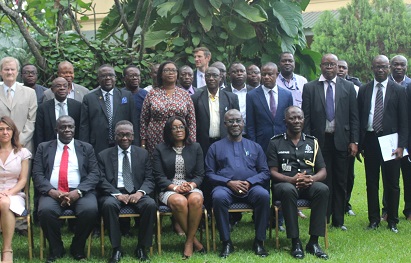Stakeholders in a group photograph after the opening session of the meeting
A Law Lecturer at the Ghana Institute of Management and Public Administration (GIMPA), Clara Beeri Kasser-Tee, has called on the Economic and Organized Crime Office (EOCO) to start going after public officials engaged in corrupt practices in order to gain the full trust of the public.
According to her, the lack of investigating sitting public officials by EOCO is contributing to the public perception of the institution as a ‘hatchet man’.
She said the tag ‘hatchet man’ meant that EOCO only investigated individuals and businesses, ‘who may not have powerful friends in government, or who have powerful ‘enemies’ in government’.
Ms. Kasser-Tee was speaking at the maiden stakeholder engagement on the activities of EOCO on the theme: “Combating Organized Crime in Ghana – A Shared Responsibility.”
The engagement with the stakeholders was to interact with them and share information on cases investigated, prosecutions and convictions obtained as well as recoveries and confiscations made.
It was also to provide stakeholders the opportunity to constructively review and evaluate the organization’s operations since its inception.
Giving an expert finding of the assessment of the organization’s activities, Ms. Kasser-Tee said for EOCO to be able to achieve its first primary objective to prevent and detect organized crime, it must be able to prevent the crime from happening in the first place.
The law lecturer noted that the current phenomenon of EOCO going after former public officers defeats the first primary objective of the organization.
Ms. Kasser-Tee said the appointment of EOCO officials from Executive Director to staff members by the President hinders the ability of the organization to investigate sitting public officers, majority of whom are appointees of the President.
“We need to review and cause the amendment of the law to free the President from the burden of appointment of staff of EOCO. This would also aid in building public trust in EOCO as a state institution rather than a ‘hatchet man’,” she stressed.
Again she called for the training of EOCO staff as organized crime has become sophisticated. “Not only is it necessary to have a legal framework that grants EOCO independence to hire and fire its own staff through transparent and stated recruitment processes, it is also necessary to sufficiently equip EOCO to carry out this mandate. So the issue of resources cannot be overemphasized,” she added.


